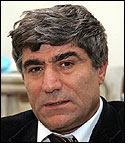25 Feb 2008 | Events
Documentary screening and panel discussion
For Hrant, for Justice: the ongoing struggle for freedom of expression in Turkey
7pm Thursday 28 February 2008
Amnesty International UK – The Human Rights Action Centre
(more…)
24 Jan 2008 | Turkey
the owner of the Armenian-Turkish newspaper Agos, Serkis Seropyan, and its new editor, Aris Nalci, are facing prosecution over a 9 November article condemning sentences passed on their colleagues.
(more…)
19 Jan 2008 | Comment
 Nouritza Matossian remembers Armenian journalist and campaigner Hrant Dink, who was murdered on this day (19 January) in 2007
Nouritza Matossian remembers Armenian journalist and campaigner Hrant Dink, who was murdered on this day (19 January) in 2007
(more…)
18 Oct 2007 | Comment, News and features
Truth, notoriously, is the first casualty of war. The truth about the fate of Armenians living under Ottoman rule in 1915 may not be dead yet, but it has certainly wilted in the glare of Washington lobby politics. What should be the subject of solemn commemoration, has instead become the subject of a Mexican standoff, with a plethora of international actors promising dire recriminations if their own view of that tragic history does not hold sway.
A Turkish government at odds with its own military, a democratic US Congress unmindful of the Presidency administration, America’s Armenian community and other ethnic lobbies, the small Armenian community left in Turkey, Armenia itself, even the separatist Kurdistan Workers Party (PKK) and the Kurdish administration in northern Iraq have all drawn their pistols. The immediate cause of this complex matrix of bluff and double bluff is a decision by the foreign affairs committee of the US House of Representatives to recommend the passing of a resolution that would recognise an Armenian genocide.
(more…)

 Nouritza Matossian remembers Armenian journalist and campaigner Hrant Dink, who was murdered on this day (19 January) in 2007
Nouritza Matossian remembers Armenian journalist and campaigner Hrant Dink, who was murdered on this day (19 January) in 2007